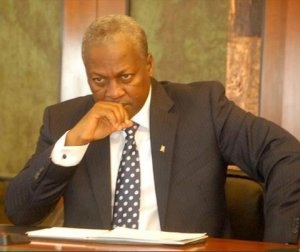President John Mahama has taken his toughest action yet on corruption, announcing new measures to strengthen the fight against the canker after criticism of his administration intensified in the wake of recent scandals.
Addressing representatives of the Commission for Human Rights and Administrative Justice (CHRAJ) and other anti-corruption bodies at the Flagstaff House on Friday, the President spelt out new orders to tackle graft -- including a suspension of all contracts between the Ministry of Youth and Sports and the embattled Ghana Youth Employment and Entrepreneurial Development Agency (GYEEDA).
The President also gave the Youth and Sports Ministry a December 15 ultimatum to complete the review of all modules and accompanying contracts under GYEEDA, but he allowed payment of workers’ arrears to go on until the end of the year.
The Sports Ministry was further instructed to cancel all contracts that do not pass the “value-for-money test” by the close of the year, while a moratorium was placed on the creation of new modules under GYEEDA.
Reports of alleged financial malfeasance have gained currency in media circles, particularly relating to GYEEDA which has come under various investigations, as well as alleged corruption within the Savannah Accelerated Development Authority (SADA).
Reacting to some of the reports, President Mahama said the Attorney-General and Justice Ministry has been tasked to work with the Youth and Sports Ministry to “secure refunds of monies wrongfully paid to or appropriated by any individuals or companies from contracts with SADA, GYEEDA and the Ghana Revenue Authority (GRA), and to retrieve the monies wrongfully paid to Waterville and Isofoton as Judgement Debts.”
According to the President, the Justice Ministry is also working on a GYEEDA bill that is expected to ensure proper oversight and efficiency in the programme’s management.
“The bill must be focused on decentralising the programme to ensure local ownership and real benefits to our communities,” he said.
President Mahama also directed that the policy which allows public office holders to purchase state bungalows allocated to them be abolished with immediate effect.
The president also instructed the Chief of Staff, Prosper Bani, to with immediate effect suspend all requests by government officials to purchase any state vehicles assigned to them for official use.
The Attorney-General was additionally instructed to review and advise on the suspension of a contract between Subah Infosolutions and the Ghana Revenue Authority (GRA) -- which is said to have contracted the company to monitor the revenues of telecom operators.
President Mahama also announced that, henceforth, any contract above GH¢5m and recurring in multiple budgets must be made public through publication in the newspapers or on the new contract management database portals to be launched soon.
He stated that the report of the Sole Commissioner on Judgment Debts will be dealt with decisively when presented to him.
The country’s fight against corruption, President Mahama said, will continue to falter as long as it is entrusted into the hands of only the “political elite” to deal with.
“As a people, our ability to fight corruption is weakened and limited when we entrust it to only the political elite, or limit our social responsibility only to talking and gossiping about it or making casual allegations. We need a paradigm-shift,” he said.
According to him, “succeeding in the fight against corruption requires agencies in various autonomous institutions -- the executive, legislature and judiciary -- as well as the public to play their part and play it well. We must think outside the box because the old ways will not meet the expectations of our people.”
President Mahama stated that the more people get involved in the fight against corruption, “the stronger our chances of success”.
Government, he said, is determined to bring maximum transparency and accountability to the public processes that have been a fertile ground for the germination and growth of corruption.
Business News of Tuesday, 19 November 2013
Source: B&FT













